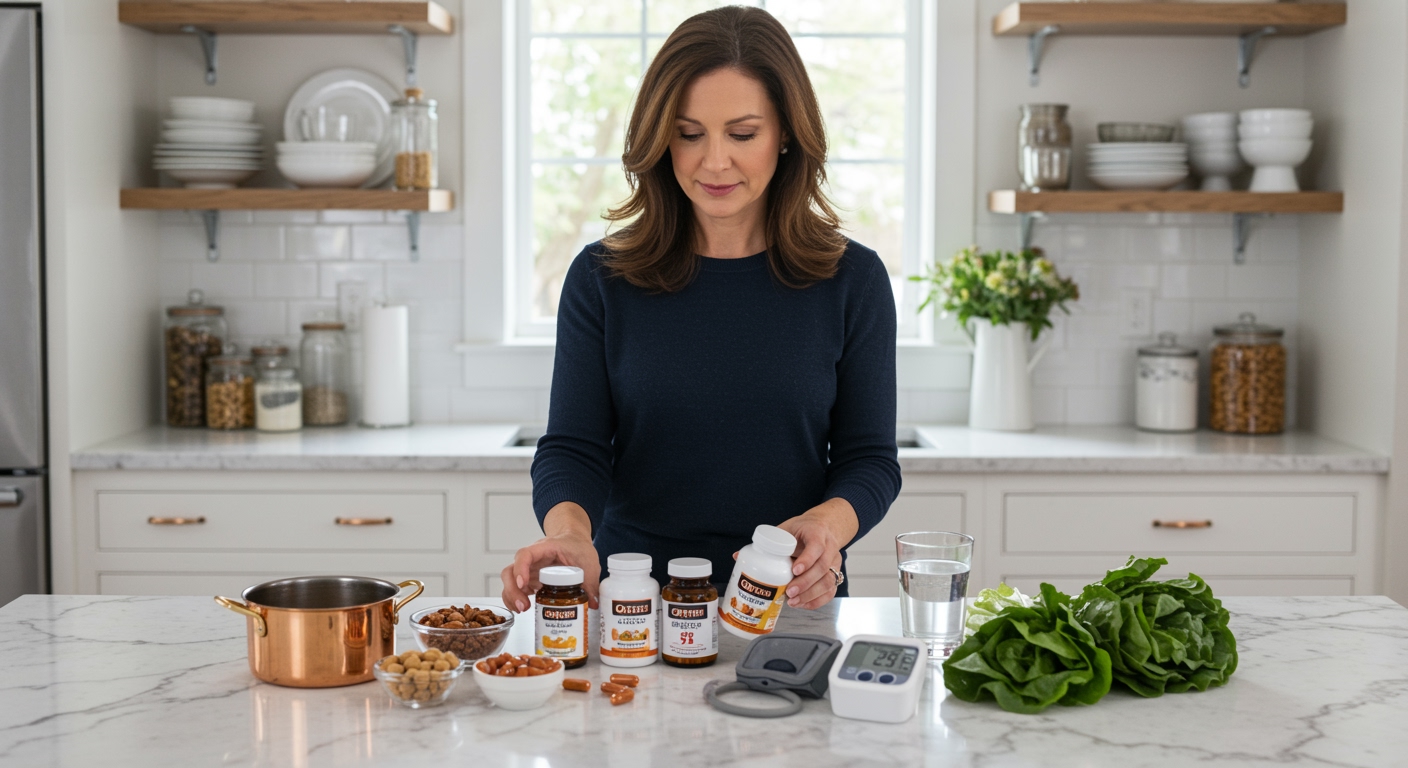✪ Key Takeaway: Copper supplements rarely help hypotension and may cause dangerous side effects without medical supervision.
Introduction
Your blood pressure drops and you feel dizzy again.
You might wonder if copper supplements could help raise your blood pressure naturally since copper plays a role in cardiovascular health.
Hi, I’m Abdur, your nutrition coach and today I’m going to explain whether copper supplements are safe and effective for people with hypotension.
What Role Does Copper Play in Blood Pressure?
Copper acts as a cofactor for several enzymes that affect your cardiovascular system.
Your body uses copper to produce collagen and elastin, which strengthen blood vessel walls.
This mineral also helps create ceruloplasmin, a protein that transports iron through your bloodstream.
When copper levels drop too low, your blood vessels may become weaker and less flexible.
However, copper deficiency severe enough to cause hypotension is extremely rare in healthy adults.
✪ Fact: Most people get adequate copper from foods like nuts, seeds, and whole grains.
Can Copper Supplements Raise Blood Pressure?
Taking copper supplements when you already have normal copper levels will not increase your blood pressure.
Your body tightly regulates copper absorption and excretion through sophisticated mechanisms.
Extra copper gets stored in your liver or eliminated through bile when levels become excessive.
Research shows that copper supplementation only helps blood pressure when someone has a documented deficiency.
Most hypotension cases stem from dehydration, medication effects, heart conditions, or hormonal imbalances rather than mineral deficiencies.
Adding copper supplements to address low blood pressure without identifying the underlying cause wastes money and time.
✪ Pro Tip: Focus on proven hypotension treatments like increasing fluid and salt intake first.
What Are the Risks of Taking Copper Supplements?
Copper supplements can cause serious toxicity when taken inappropriately.
Excess copper interferes with iron and zinc absorption, leading to deficiencies of these important minerals.
High copper levels may cause nausea, vomiting, diarrhea, and stomach pain.
Long-term copper excess damages your liver and can lead to neurological problems.
People with Wilson disease, a genetic condition affecting copper metabolism, should never take copper supplements.
The tolerable upper limit for copper is 10 milligrams daily for adults, but most people need only 0.9 milligrams.
✪ Note: Always consult your doctor before starting any mineral supplements.
How Should You Test for Copper Deficiency?
Blood tests measuring serum copper and ceruloplasmin levels can detect deficiency.
Your doctor may also check your copper levels through urine tests over 24 hours.
True copper deficiency usually occurs only in people with malabsorption disorders or those receiving long-term parenteral nutrition.
Premature infants and people with severe malnutrition face higher risks of copper deficiency.
If tests show normal copper levels, supplements will not help your hypotension.
Focus instead on identifying and treating the actual cause of your low blood pressure.
✪ Fact: Copper deficiency symptoms include anemia, bone problems, and immune dysfunction.
What Are Better Alternatives for Managing Hypotension?
Increasing your fluid intake helps expand blood volume and raise blood pressure naturally.
Adding more salt to your diet can help retain fluid and improve circulation.
Wearing compression stockings prevents blood from pooling in your legs.
Regular exercise strengthens your heart and improves blood vessel function.
Eating smaller, more frequent meals prevents post-meal blood pressure drops.
Standing up slowly gives your body time to adjust and prevents dizziness.
These proven strategies work better than unproven supplement approaches for most people with hypotension.
✪ Pro Tip: Keep a blood pressure log to track which strategies work best for you.
The Bottom Line
Copper supplements rarely help people with hypotension and may cause harmful side effects without medical supervision.
Smart nutrition focuses on proven solutions rather than chasing mineral magic bullets.
Share your thoughts about managing low blood pressure naturally in the comments below and let me know what strategies have worked best for you.
References
At NutritionCrown, we use quality and credible sources to ensure our content is accurate and trustworthy. Below are the sources referenced in creating this article:
- NIH Office of Dietary Supplements: Copper – Health Professional Fact Sheet
- Harvard T.H. Chan School of Public Health: Copper – The Nutrition Source
- PubMed Central: Copper and human health: biochemistry, genetics, and strategies for modeling dose-response relationships
- PeaceHealth: Copper: Uses, Side Effects, Interactions, Dosage, and Warning





